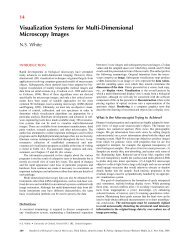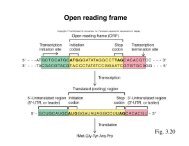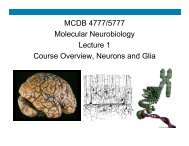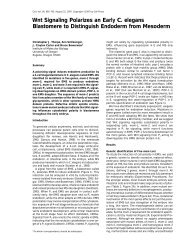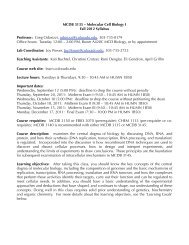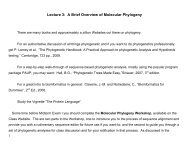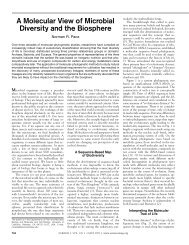2012 Program Booklet - MCD Biology - University of Colorado Boulder
2012 Program Booklet - MCD Biology - University of Colorado Boulder
2012 Program Booklet - MCD Biology - University of Colorado Boulder
You also want an ePaper? Increase the reach of your titles
YUMPU automatically turns print PDFs into web optimized ePapers that Google loves.
John T. Schiller, PhD<br />
Head, Neoplastic Disease Section<br />
Deputy Laboratory Chief<br />
Laboratory <strong>of</strong> Cellular Oncology<br />
National Cancer Institute, Bethesda, MD.<br />
Title: Understanding and Learning from the<br />
Success <strong>of</strong> Human Papillomavirus Prophylactic<br />
Vaccines<br />
Saturday, October 13<br />
2:00 – 2:45 pm<br />
JSCBB Butcher Auditorium<br />
Abstract:<br />
The development <strong>of</strong> antimicrobial vaccines is undoubtedly one <strong>of</strong> the greatest triumphs <strong>of</strong><br />
biomedical research. Given the extraordinary effectiveness <strong>of</strong> vaccines against a wide array <strong>of</strong><br />
bacterial and viral pathogens, the failure to develop effective vaccines against the most<br />
common sexually transmitted infections, especially HIV, has been both surprising and<br />
frustrating. The only notable exception is the development <strong>of</strong> prophylactic vaccines against<br />
genital human papillomaviruses (HPVs), the primary etiologic agents in an estimated 5% <strong>of</strong><br />
human cancers, most importantly cervical cancer. In recently concluded clinical trials, the<br />
vaccines were safe and very effective at preventing sexually transmitted infection and the<br />
neoplastic diseases induced by the HPV types targeted by the vaccines. They are now licensed<br />
in many countries worldwide for the prevention <strong>of</strong> cervical and other HPV-‐associated cancers<br />
and various other hyperproliferative diseases. It is therefore interesting to examine why the<br />
HPV vaccines have succeeded whereas those targeting other sexually transmitted infections<br />
(STIs) have failed. In this seminar, I will briefly review the association <strong>of</strong> HPVs with human<br />
cancer and other neoplastic diseases, describe the composition <strong>of</strong> the two commercial<br />
vaccines and summarize their efficacy in clinical trials and their emerging effectiveness in<br />
general vaccination programs. Specific aspects <strong>of</strong> HPV molecular biology and vaccine<br />
composition that likely contribute to their remarkable success will then be discussed. Finally, I<br />
will speculate on how the lessons learned from the HPV vaccines might influence the future <strong>of</strong><br />
vaccine development for other STIs, particularly HIV and herpes simplex.





